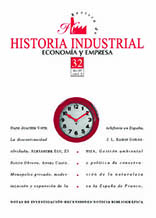The Forgotten Discontinuity: Labor Input. Technological Change and New Goods during the Industrial Revolution
Keywords:
Industrial Revolution, Growth, Hedonics, Value of VarietyAbstract
How revolutionary was the Industrial Revolution? One generation of scholars has argued -not very. This article takes issue with that conclusion. It examines three aspects that fundamentally recast our evaluation of the economic transformation that began in Britain in the 1750s. First, more flexible approaches to TFP accounting break down the simple distinction between capital accumulation and technological change. Second, hedonic measures of output regularly produce much higher numbers for output growth - much of the downward revisionism is a reflection of measurement that is too narrow to capture of technological change. Third, the value of variety must have been very large. Model calculations for the impact of these corrections are performed and discussed. The article concludes with an agenda for future research.Downloads
Downloads
Published
How to Cite
Issue
Section
License
We have been applying a Creative Commons Attribution license (CC-BY) since 2019, before that year we had a partial open access policy, which included open access for the first two months after publication, followed by an embargo policy for non-subscribers, as access to the last 4 published issues was restricted to journal subscribers. In contrast, early-view articles were always open access prior to publication in an assigned volume. Until 2024 the access to the last 4 published numbers was restricted to those who were subscripted to the journal.
The author assigns all rights to the publisher. Creative Commons
The author who publishes in this journal agrees to the following terms:
- The author assigns all intellectual property rights exclusively to the publisher for the entire duration of the applicable intellectual property rights. The University of Barcelona holds the copyright ownership of the contents published in the journal.
- The publisher will distribute the texts under the Creative Commons Attribution License, which allows others to share the work, provided that they acknowledge the authorship, its initial publication in this journal, and the conditions of the license.





